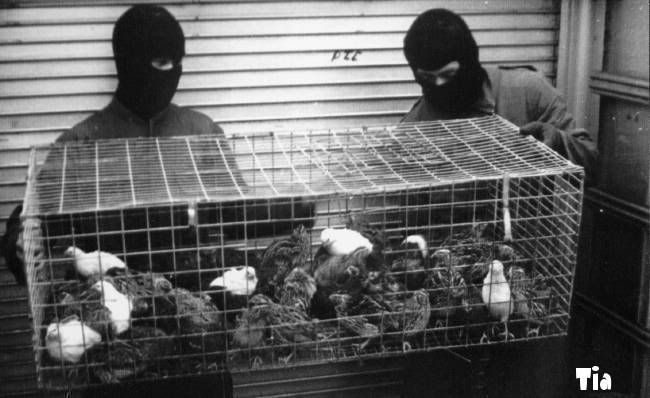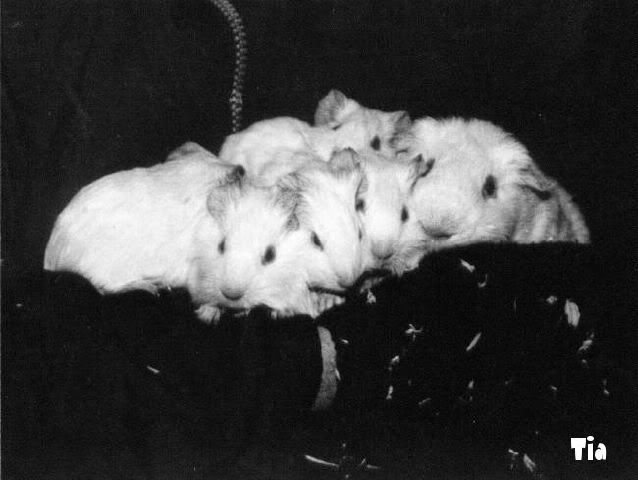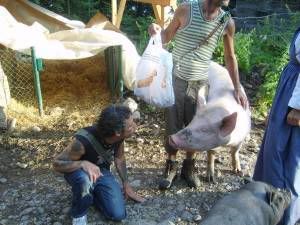Phil
Cathy~Exposing The Truth~

to take immediate and decisive action.
ALF activists operate under cover, at night, wearing balaclavas and ski masks,
and in small cells of a few people. After careful reconnaissance, skilled liberation teams
break into buildings housing animal prisoners in order to release them (e.g. , mink and
coyotes) or rescue them (e.g., cats, dogs, mice, and guinea pigs). They seize and/or

destroy equipment, property, and materials used to exploit animals, and they use arson as
a potent weapon to raze buildings and laboratories to the ground. They have cost the
animal exploitation industries hundreds of millions of dollars. 3 They willfully break the
law because the law wrongly consigns animals to cages and confinement, to loneliness
and pain, to torture and death. They target a wide range of animal exploiters, from
vivisectors and the fur industry to slaughter houses, foie gras producers, and fast food
restaurants.
Resolved not to harm living beings, motivated by love, empathy, compassion, and
justice, animal liberationists are the antithesis of the “terrorists“ that government,
industries, and mass media ideologues impugn them to be. They are not violent
aggressors against life; they are defenders of the peaceable kingdom. They uphold rights
not covered by law, knowing that the legal structure is defined by and for human
supremacists. The goal of the ALF is not simply to liberate individual animals here and
there; it is to free all animals from every form of slavery that binds them to human
oppressors.

The ALF, and the animal rights movement as a whole, is attacking the entire
institutional framework of animal exploitation along with the domineering values,
mindset, identities, and worldviews of the human species.
Although human slavery has been outlawed in “liberal democracies” (while
industries command new slave trades in domestic and foreign sweatshops) where many
dispossessed and disenfranchised groups gain more rights and respect, animal slavery has
become worse than ever. This is the case in the sheer number of animals killed, the
degree of violation of their natural lives (culminating in the technological manipulations
of genetic engineering and cloning), and the intensity of their suffering (as evident in the
horrors of vivisection, fur farming, slaughter houses, mechanized slaughter, puppy mills,
and so on). Animal "Welfare"” laws do little but regulate the details of exploitation.4

Just as nineteenth-century white abolitionists in the U.S. worked across racial
lines to create new forms of solidarity, so the new freedom fighters reach across species
lines to help our fellow beings in the animal world. In this endeavor, they unleash a
frontal assault on the unquestioned mentality that says animals are objects, resources, or
property, and they advance the modern universalization of rights process that is the key
marker of moral progress. 5
By expanding the definition of the moral community, animal liberationists
challenge long-entrenched prejudices. These relate not only to class, gender, race, sexual
orientation, or specific interest group, but also to the human species itself—to the
arrogant conception of its place in the web of life and its ugly, condescending, vicious,
and violent attitudes toward other species. Speciesism is the belief that nonhuman species
exist to serve the needs of the human species, that animals are in various senses “inferior”
to human beings, and therefore that one can favor human over nonhuman interests
according to species status alone. 6 Just like racism or sexism, speciesism creates a false
dualistic division between one group and another in order to arrange the differences
hierarchically and justify the domination of the “superior” over the “inferior. ” Just as
society has discerned that it is prejudiced, illogical, and unacceptable for whites to
devalue people of color and for men to diminish women, so it is beginning to learn how
utterly arbitrary and irrational it is for human animals to position themselves over
nonhuman animals because of species differences. Among animals who are all sentient
subjects of a life, these differences – humanity’s claim to be the sole bearer of “reason”
and “language” – are no more ethically relevant than differences of gender or skin color,
yet in the unevolved psychology of the human primate they have decisive bearing. The
theory—speciesism—informs the practice—unspeakably cruel forms of domination,
torture, violence, and killing.
The animal liberation struggle is the most difficult battle human beings have ever
fought, because it requires universal consent to abandon what most perceive as their
absolute privileges and God-given rights to exploit animals by sole virtue of their human
status. Moreover, where the stakes of human liberation struggles were largely confined to
particular interests, the failure of human beings to win liberation for animals will havecatastrophic and global consequences for all humanity, if for no other reason than
systemic environmental collapse.














0 Comments:
Post a Comment